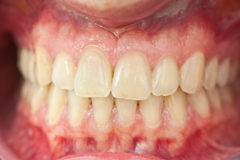Q: Is dental bonding like a Porcelain Veneer?
Dental Bonding is a procedure that tries to achieve the same result as a porcelain veneer… but in the end, it simply falls short and I’ll tell you why. A tooth with dental bonding looks its best when you’ve just had it done. Due to the nature of the material, bonded teeth tend to stain quite easily i.e., from smoking, tea or coffee. This does not happen with dental veneers.
Bonded teeth are also not as strong as dental veneers. Because they are more fragile, I always advise people to stay away from eating foods like corn on the cob and apples, which put a lot of pressure on the front teeth.
Q: What is dental bonding and what is its Purpose?
Dental bonding is a procedure in which white filling material is applied to the front surface of a tooth in order to remove staining, fill in gaps and fix cracked and or chipped teeth. It is a cosmetic procedure.
Q: What are the Advantages of dental bonding?
1) Minimal drilling or anaesthetics are needed to do the procedure. It is considered to be a conservative procedure in dentistry.
2) The cost of dental bonding is often less than you may think. It is a relatively inexpensive way to improve your appearance. In fact, the procedure is routinely covered by insurance companies.
3) Only one appointment is needed.
Q: How does dental bonding work?
White filling material or resin is ‘glued’ via a special bonding agent to the enamel (the outer layer of the tooth). A thin layer of enamel is removed from the front surface of the tooth and then we apply the resin material. We remove a thin layer of enamel to accommodate the resin so the bonded tooth doesn’t end up looking too thick.
In addition, by removing some enamel, we improve the bonding strength of the filling material to the tooth. When we remove some ‘surface’ enamel, we expose special enamel rods within the enamel which ensures a strong-hold to the filling material.
Note: There are situations where we don’t even need to remove any tooth structure and we bond directly on to the enamel.
Q: How do you take care of your newly bonded teeth?
Keep them clean! It would be asking a lot to say ‘no smoking, coffee or tea,’ but keep in mind, they do stain easily.
When it comes to your newly bonded teeth, handle with care. In other words, try not to bite or use excessive force that may cause them to fracture. As mentioned earlier, it is best to stay away from foods like corn on the cob and apples where a lot of force is placed on the front teeth. It’s just not meant for teeth to have lots of filling material loaded onto them…they ultimately don’t hold on well.
I’m not saying that bonding isn’t a viable treatment option, but in terms of strength and durability, Porcelain Veneers are the clear winner!
We practice preventative dentistry, cosmetic dentistry and more. Call us today at (905) 791-3867 to learn more about the benefits of dental bonding.
About Dr. F. Keshavarz Dentistry
You will find our dentists and office staff to be friendly, gentle, safe and accommodating and diverse in nature. Our staff takes the time to make each person feel comfortable and treated with exceptional care.







